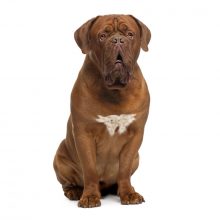Dogue de Bordeaux
Lifestyle Needs

The Dogue de Bordeaux is a big Mastiff-type dog with a very large head. In his past he was used for hunting and fighting, so it is not surprising that he is an exceptionally strong and quite dominant dog. His owner would need to be experienced in handling and training a dog of this size and type. He does not make the ideal family pet. He will need regular grooming and plenty of exercise.
Genetic Diversity
(Known as Coefficient of Inbreeding: 'COI'. It should be as low as possible.)
The UK Kennel Club breed average COI is 6.5% - See 'A Beginners Guide to COI'
Gene Pool Size
(Known as Effective Population Size: 'EPS')
151.5
EPS is a measure of how many individuals are contributing genetically to a breed population. It is a measure of the size of the gene pool in a breed. Lower than 100 is considered critical by conservationists and below 50 brings a breed close to extinction. For more information see the Kennel Club article.
Health and Welfare Problems due to Conformation
(Body shape and physical characteristics)
- Facial skinfolds may be prone to infection
- Drooling
- Poor eyelid conformation leads to ocular tissue exposure causing damage and infection.
- Unsound movement due to the size and weight of this dog
- Gastric dilatation-volvulus (GDV) (Bloat) (dilation and twisting of the stomach which can be fatal if not given emergency veterinary treatment)
BVA/KC Health Schemes: www.bva.co.uk/chs
- Hip dysplasia: breed 5 year mean score 20.2 (parents should be much lower)
- Elbow dysplasia: ideally O:O
- Eye Scheme
The Dogue is one of the 15 high profile breeds designated by the Kennel Club as requiring particular monitoring by reason of visible conditions which may cause health and welfare concerns.
- Eye testing in brachycephalic dogs should be routine as a foreshortened head/face can cause substantial welfare problems throughout a dog’s life.
Estimated Breeding Values (EBVs) : EBVs for Hip Dysplasia are available for this breed
www.thekennelclub.org.uk/about-ebvs
DNA Tests Available
DogWellNet and IPFD Harmonisation of Genetic Testing for Dogs (HGTD)
www.dogwellnet.com/breeds
- Canine Multi-focal Retinopathy 1 (CMR 1)
Availability of a DNA test does not mean that it is always necessary or even desirable for breeders to use this test.
Other Breed-Specific Health Screening Schemes
None known
Ask the breeder to show you the certificates for the above tests/screening for both parents. If any of the above tests have not been considered necessary by the breeder (and there may be good reasons), ask her to explain why.
Other Diseases Reported
(For which there are currently no genetic or screening tests for sire or dam)
- Heart disease – Subaortic stenosis; Patent ductus arteriosus; Tricuspid valve dysplasia
- Bloat/GDV
- Dermatitis
- Familial nephropathy
- Ectropion
- Cancers (various)
Ask the breeder about the medical history of the parents, grandparents and great grandparents. Consider carefully whether to purchase a puppy if some of these or other diseases are in the family line.
Ask about the breeder’s policy in cases of serious genetic diseases occurring to your puppy in later life. Good breeders will request to be informed of such events in order to improve future breeding decisions.
You are strongly advised to buy from a breeder who uses (or is prepared to use) the AWF Puppy Contract and Puppy Information Pack (PIP): www.puppycontract.org.uk
The breeder should also be familiar with the CFSG/DBRG Code of Practice for Dog Breeding
Or the Kennel Club’s Assured Breeders Scheme Standard and Guidance:
Standard PDF | Guidance PDF